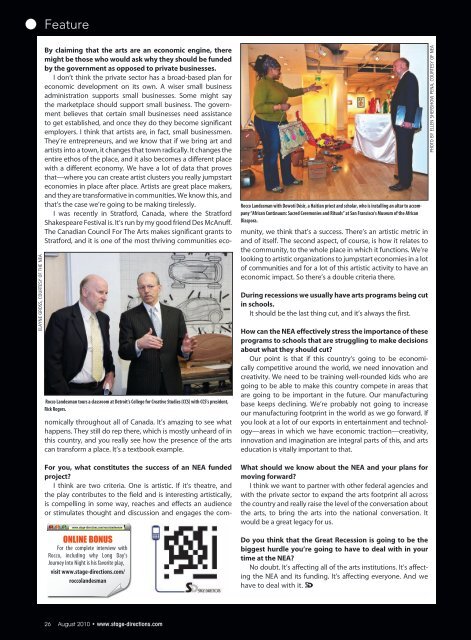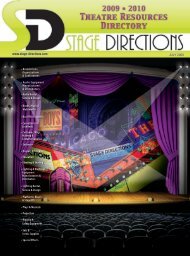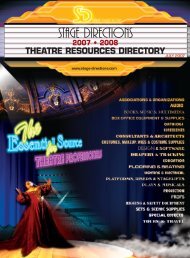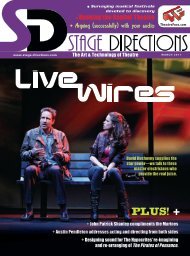Download a PDF - Stage Directions Magazine
Download a PDF - Stage Directions Magazine
Download a PDF - Stage Directions Magazine
You also want an ePaper? Increase the reach of your titles
YUMPU automatically turns print PDFs into web optimized ePapers that Google loves.
Feature<br />
Elayne Gross, courtesy of the NEA<br />
Rocco Landesman tours a classroom at Detroit’s College for Creative Studies (CCS) with CCS’s president,<br />
Rick Rogers.<br />
By claiming that the arts are an economic engine, there<br />
might be those who would ask why they should be funded<br />
by the government as opposed to private businesses.<br />
I don’t think the private sector has a broad-based plan for<br />
economic development on its own. A wiser small business<br />
administration supports small businesses. Some might say<br />
the marketplace should support small business. The government<br />
believes that certain small businesses need assistance<br />
to get established, and once they do they become significant<br />
employers. I think that artists are, in fact, small businessmen.<br />
They’re entrepreneurs, and we know that if we bring art and<br />
artists into a town, it changes that town radically. It changes the<br />
entire ethos of the place, and it also becomes a different place<br />
with a different economy. We have a lot of data that proves<br />
that—where you can create artist clusters you really jumpstart<br />
economies in place after place. Artists are great place makers,<br />
and they are transformative in communities. We know this, and<br />
that’s the case we’re going to be making tirelessly.<br />
I was recently in Stratford, Canada, where the Stratford<br />
Shakespeare Festival is. It’s run by my good friend Des McAnuff.<br />
The Canadian Council For The Arts makes significant grants to<br />
Stratford, and it is one of the most thriving communities economically<br />
throughout all of Canada. It’s amazing to see what<br />
happens. They still do rep there, which is mostly unheard of in<br />
this country, and you really see how the presence of the arts<br />
can transform a place. It’s a textbook example.<br />
www.stage-directions.com/roccolandesman<br />
ONLINE BONUS<br />
For the complete interview with<br />
Rocco, including why Long Day’s<br />
Journey Into Night is his favorite play,<br />
visit www.stage-directions.com/<br />
roccolandesman<br />
For you, what constitutes the success of an NEA funded<br />
project?<br />
I think are two criteria. One is artistic. If it’s theatre, and<br />
the play contributes to the field and is interesting artistically,<br />
is compelling in some way, reaches and effects an audience<br />
or stimulates thought and discussion and engages the com-<br />
Rocco Landesman with Dowoti Désir, a Haitian priest and scholar, who is installing an altar to accompany<br />
“African Continuum: Sacred Ceremonies and Rituals” at San Francisco’s Museum of the African<br />
Diaspora.<br />
munity, we think that’s a success. There’s an artistic metric in<br />
and of itself. The second aspect, of course, is how it relates to<br />
the community, to the whole place in which it functions. We’re<br />
looking to artistic organizations to jumpstart economies in a lot<br />
of communities and for a lot of this artistic activity to have an<br />
economic impact. So there’s a double criteria there.<br />
During recessions we usually have arts programs being cut<br />
in schools.<br />
It should be the last thing cut, and it’s always the first.<br />
How can the NEA effectively stress the importance of these<br />
programs to schools that are struggling to make decisions<br />
about what they should cut?<br />
Our point is that if this country’s going to be economically<br />
competitive around the world, we need innovation and<br />
creativity. We need to be training well-rounded kids who are<br />
going to be able to make this country compete in areas that<br />
are going to be important in the future. Our manufacturing<br />
base keeps declining. We’re probably not going to increase<br />
our manufacturing footprint in the world as we go forward. If<br />
you look at a lot of our exports in entertainment and technology—areas<br />
in which we have economic traction—creativity,<br />
innovation and imagination are integral parts of this, and arts<br />
education is vitally important to that.<br />
What should we know about the NEA and your plans for<br />
moving forward?<br />
I think we want to partner with other federal agencies and<br />
with the private sector to expand the arts footprint all across<br />
the country and really raise the level of the conversation about<br />
the arts, to bring the arts into the national conversation. It<br />
would be a great legacy for us.<br />
Do you think that the Great Recession is going to be the<br />
biggest hurdle you’re going to have to deal with in your<br />
time at the NEA?<br />
No doubt. It’s affecting all of the arts institutions. It’s affecting<br />
the NEA and its funding. It’s affecting everyone. And we<br />
have to deal with it.<br />
Photo by Ellen Shershow Pena, courtesy of NEA<br />
26 August 2010 • www.stage-directions.com

















